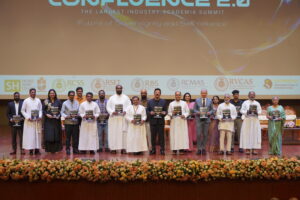As he always did, Archimedes entered his bath and sank slowly into the warm water. The answer to the question that had troubled him for days came like lightning in an instant. He had discovered an escape route—“Eureka!” he cried, leaping with delight. Like wet clay, our minds become works of art that are appreciated for years when they are shaped and carved using the best materials. Technical skills are just one piece of a much bigger jigsaw that still needs to be solved, much like Archimedes changed history and expanded our grasp of physics.

Nine pupils, including Aiden, were placed at EY. When he muses, “It’s more than just what’s taught in our curriculum,” he smiles with confidence. He had to deal with the early confusion of picking a college major, as computer science was the most popular option because of its wide range of employment options. The next four years of his academic career at Rajagiri, however, were shaped by his fascination with AIDS (Artificial Intelligence and Data Science).
The best time to explore is during college, when one can try out many routes and select the one that best suits them. Because of unforeseen circumstances, Aiden was thrust into the realm of impromptu speeches during his first year as an anchor for Voice Hunt. In retrospect, he remembers how IEDC is very dear to him. His experience, which has included handling erratic circumstances and assuming an authoritative position as a member of EXECOM, has tested his ability to adapt and shaped him into a person who can confidently handle stress.
It takes more than just honing your coding abilities to land a job. In the process of conducting interviews and aptitude tests, both technical and HR rounds are essential. Even if one might not be an expert in every area, success is much more likely when one adopts a strategic approach. Despite their important function, aptitude tests are frequently disregarded because of preconceived beliefs. Every day, thousands of applications are received by major organizations, making it impractical to conduct technical interviews with every applicant. As a result, aptitude tests serve as a screening tool, generating a shortlist of applicants prior to the technical round.
Securing a job is more than just refining your coding skills. From aptitude tests to interviews, both technical and HR rounds play a crucial role. While one may not master every skill, having a strategic approach significantly increases the chances of success.
Aptitude tests are often overlooked due to preconceived notions, but they serve a vital purpose. With top companies receiving thousands of applications daily, conducting technical interviews for every candidate is impractical. Thus, aptitude tests act as a filtering mechanism, shortlisting candidates before the technical round.
Conversely, technical interviews are entirely role-specific. They frequently include two or more job-specific coding questions. Preferred languages include C, Java, Python and database management languages like C++ and SQL, which many students believed they had abandoned but now find themselves in at a pivotal point in their careers.
Learning the fundamentals is essential, and C programming is a great approach to lay a solid foundation. Understanding the basic ideas thoroughly makes it much easier to solve complicated problems, whether they involve simple traversal programs or algorithms. Sites such as LeetCode, NeetCode, and HackerRank offer useful tools for honing problem-solving abilities and gaining a better understanding of coding methods.
Meanwhile, HR interviews provide an opportunity to confidently introduce oneself. Answering questions is only one aspect of it; another is having a dialogue that demonstrates your strengths and demonstrates your sincere interest in the business. Candidates can gain an advantage by researching the company and, if feasible, the interviewers. Sites such as LinkedIn offer useful information about recent advancements, corporate culture, and even possible interviewers.

S8 IT’s Liz Biju recently got a job at IBM. Her modest manner uplifts even the most weary souls, yet she nonetheless radiates a serene confidence. Getting a job at one of the top tech companies is an incredible accomplishment for someone whose technical aptitude was, by her own admission, not excellent in the first place.
“Joining the company was like starting a new chapter in my life, which forced me to think back on and value the previous chapters,” she says. We are exposed to a variety of perspectives in the corporate world, just like when we enroll in a new school. When one is working with thousands of people, it forces one to reflect.
She further emphasised that while peers may finish projects that appear doable in two days in a single night. Rather than feeling overburdened, it is crucial to keep an upbeat outlook. The important thing is to be motivated instead of disheartened.
Liz attributes a large portion of her development to her participation in Rajagiri clubs like IEDC and IIC. She was exposed to real-world difficulties through these experiences, such as cold contacting sizable groups and making snap decisions under duress. The ability to handle erratic circumstances without inciting conflict is a priceless talent that goes beyond the scope of any technical program.
It is difficult to become proficient in every skill. However, the quest of achievement is much more attainable when one possesses insight and strategic acumen. Resilience, tenacity, and enthusiasm are necessary for this journey— more than just idealism. It takes commitment and persistent work to realize that long-held dream, rather than sheer luck.




